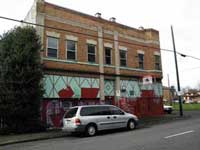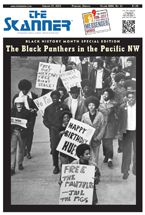 The Cleo-Liliane Social Club today; rumor has it developers plan a condo conversion there. |
A fixture of the North Williams Avenue landscape and the local Black social scene is under pressure to change its ways or face a possible fine or loss of its liquor license.
Officers of the Cleo-Lillian Social Club, a well-known gathering spot in the Albina community since 1958, said they're trying to stem the tide building against the establishment because of complaints from neighbors about noisy patrons.
They want the community to stand up in support of the club, write letters to the Oregon Liquor Control Commission and the city of Portland and attend any hearings about the establishment's future. Also, if the club decides to change to a restaurant format, for instance, investors will be needed, President Robert Borrowing said.
To address the complaints, club officers so far have distributed and posted an anti-noise policy around the establishment explaining what behaviors need to stop immediately. Patrons are barred from the club for a violation, and security guards have been hired to keep things under control inside and outside the building Wednesdays through Saturdays.
 To read all the articles in The Skanner Annual Black History Edition click here |
Browning said the club has increased the membership fee from $5 to $25 to try to attract a new type of member and long ago cut its closing hours from 2:30 a.m. to 1 a.m. June through September and 1:30 a.m. October through May. "If we closed any earlier, it'd be economic suicide."
Still, OLCC and city officials say something more aggressive and noticeable has to be done soon. Otherwise, allowing the club to continue operating as it does now could be hard.
At the end of June, the OLCC issued the club a ticket charging it with " a history of serious and persistent problems involving disturbances" affecting neighborhood livability. The club had been cited once before, for selling to nonmember in 1989.
Then, form July to October, the club received 21 complaints from neighbors about loud stereos, talking and laughing, peeling tires, honking and people shouting after midnight, OLCC spokesperson Louise Kasper said. In the past five years, inspectors have talked with club officials about neighborhood livability concerns at least 10 times, she said.
Kasper said she doesn't know what penalty the June charges will bring because a formal letter to the club is spending. The letter could be complete in a couple of weeks, she said.
"It's a very serious violation," Kasper said. "Over the years, they've had numerous warnings and verbal instructions from our inspectors.
We want our licensees to be good neighbors. People take exception to being awakened out of their sleep."
Kasper said Cleo's has had its Class B liquor license - which allows private clubs to serve beer, wine and hard liquor - since 1966. When it was renewed in October, 19 restrictions were put on it, which she said isn't done often.
"We try lots of different methods to help people build complying businesses," Kasper said. "We've worked really hard to be fair with the club."
Browning and his brother Xavier, the club's vice president, maintain although they appreciate OLCC and city officials' patience and willingness to work with them, the constant complaints from some neighbors who they think aren't interested in coming to a mutual agreement say a lot about the new face of the area. Both men think the club is a victim of the community's gentrification.
They say some people would like to see the club gone so the property can be taken over and redeveloped. They also contend a handful of determined, new neighbors are to blame for the barrage of complaints.
"It seemed like it was (one neighbor's) goal to have the club removed," Xavier Browning said of a White woman who once lived about three doors down from the club on North Monroe Street and organized other residents. "This is a diverse community, but it's like they don't want us in the area.
"They might claim they want diversity. But they're not neighborly."
Cleo's has been at its current site at 3041 N. Williams since its inception and is open every day. On an average day, the club has about 20 patrons in the afternoon and four times as many in the evenings.
To be a member, a person must be employed, be 25 or older, be established in the community, pay the membership fee and have legitimate references. When sisters Cleo and Lillian founded it 40 years ago, it was a popular spot for soul food, card games and special luncheons.
Robert Browning said that through the years, the crowd and look of the club have changed somewhat but that it is still a part of the community fabric, sponsors a bowling team and donates to local charities. However, he said the club officers realize change is inevitable with time.
So, the club has outlined five scenarios to be accomplished by May 31 -- the start of its busy summer season - to address the noise problem. The possibilities include opening a public soul food restaurant at the current site; ceasing operations; asking city and state officials for an administrative hearing; and moving to a nonresidential neighborhood.
The club once considered moving in 1996 because of neighborhood and membership concerns. However, it could not find affordable property in a nonresidential area in North/Northeast Portland.
Browning said that likely still would be an obstacle today if the club were to try to relocate. Other long-term plans include changing the club to a jazz/blues format to attract a more mature crowd; creating an advisory committee; developing meeting spaces available during business hours; and renovating the interior and exterior of the building.
Pressure is mounting," Robert Browning said. "It's basically a situation where the neighbors are going to keep complaining, so we have to find a way to eliminate the noise, and we need to solve the problem right away. "














































































































































































































































































































